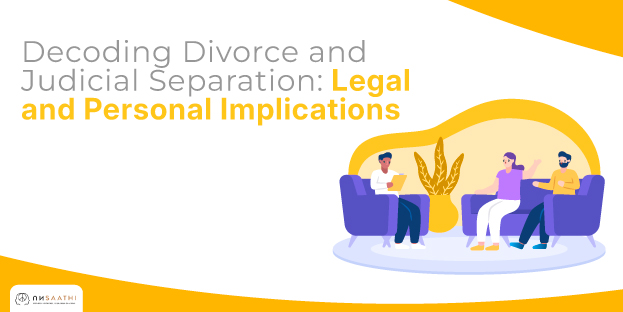
The impact of a breaking marriage can echo through every neighbourhood of your life until each block feels like something on an alien continent. Divorce is both an emotional and practical experience and the process of healing afterward can feel incredibly daunting.
The familiar routines are broken, social circles may change in alien ways, and the foundations you built in your life may feel like they’ve crumbled. But, within all this chaos, there is some rich ground for even deeper work: the opportunity to rebuild, redefine, and cultivate a life that is uniquely you: your own, fresh, new space for expansion and growth.
This complete guide and blog post will provide steps for your post-divorce recovery task and concepts and basics for stressed couples. It recognizes the challenges post-divorce and offers actionable tips to help you heal, reconnect, and build a meaningful future.
Phase 1: Recognition and Processing the Loss Post-Divorce
Divorce, no matter the circumstances, is a considerable loss — the loss of a partnership, shared dreams and an expected future. Giving yourself time and space to mourn this loss is an essential first step in healing.
Feel It All
Allow yourself to feel that sadness, anger, confusion, and relief are okay. Seeking healthy outlets for those feelings is also essential—journaling, talking to a trusted friend or family member, or professional counselling. In today’s accelerated pace of life, ensuring you take time for this emotional space is key.
Seek Support Systems
Tap into your existing network of friends and family post-divorce. Reach out to people who understand and can provide nonjudgmental support. We recommend you join the divorce support groups around you, where you can share your experiences and learn from other people with similar situations. Online communities are also a way to feel connected.
Be Good to Yourself
Be gentle and forgiving with yourself. It takes time to heal post-divorce. There are good and bad days. Thus, it is crucial not to blame yourself; dedicate yourself to bathing your emotional health, from yoga and meditation studios to peaceful parks and events.
Limit Communication (At Least for the First Stage)
Depending on the nature of your relationship, limiting communication, especially in the first stage, is essential for establishing some level of emotional distance and avoiding new conflicts. Set boundaries for communication to discuss only what is necessary, especially about children.
Phase 2: Rebuilding Your Identity (Starting Over)
Divorce, as it turns out, is a merging of identities. Post-divorce, it is time to find out who you are.
Reconnect with What You Love
What did you love to do before or as you were married that you might have pushed to the side? Reconnect with things that inspired you, such as hobbies, interests and activities. There are infinite options around you, from art galleries to historical places to dance classes and book clubs. The choices are countless.
Pick Up A New Hobby
This is a great time to try new things you have always wanted to. Take a cooking class, learn a language, or join a trekking group—search your place; it will surely be a potpourri of interest.
Identify Your Values And Goals
Take the time to think about what you genuinely care about in life. What do you value as a human being? What are your hopes for the future? Setting new goals, whether small or large, can give you a sense of direction and purpose.
Take Time to Be Alone
Being comfortable with your own presence is an essential milestone in rebuilding your life. Dedicate this period to introspection, self-reflection, or things you personally reward yourself with. Head to one of the many cafes around you with a good book, or chill at home.
Phase 3: Establishing The New Support System/Social Life
Your social landscape may have changed post-divorce. Building a new support network is essential for remaining connected and supported.
Can fall back in the arms of friends
Put time and effort into your friendships post-divorce. Talk with friends you might have fallen out of touch with and schedule a time to catch up.
Make New Connections
Keep your nets open to catching new people. Discover social events, hobby groups, or volunteer opportunities in Delhi that match your interests. It is also a means of reaching out to people with similar interests through online platforms.
For the Future
Desire for companionship may be natural, but be mindful before getting into dating. Build yourself up, heal and get yourself right before anything else. When you do, step out into dating post-divorce, do it with clarity and realistic expectations.
Make Your Home a Supportive Space
Make your home your sanctuary. Fill your surroundings with comforts and joys. In the crazed circle of Delhi, cone-stuffed into multidimensional work and social life, a personal and relaxed space is a need.
Phase 4: Coping with Practicalities & Finances
Separation means many changes on the practical and financial front, with its own cost of living and logistical issues.
Get a good grasp of your financial situation and secure your finances. Having assets and debts can be overwhelming, so you need to manage and plan for future financial security. Make a budget and follow it to the letter.
Get Stable Living Arrangements
Make sure you have a safe and stable place to live. Whether you stay in the family home or obtain a new residence, prioritize creating a comfortable and secure environment.
Settle Legal Affairs
Ensure you have closed all legal matters in your notice. If you face any additional legal troubles, the best decision is to consult a trusted divorce lawyer around you.
Co-Parenting if Children Are Involved
If you have children together, focusing on your co-parenting dynamic and working towards a positive relationship with your ex-spouse is critical. Put the children first and work to ensure a consistent and supportive environment in both homes post-divorce. The traffic congestion and logistical issues make it imperative that an easy transition of events between venues is communicated and planned.
Phase 5: Nurturing Growth and the Future
Unfortunately, post divorce is never just about picking up the pieces. It is an opportunity to create something you can be proud of and call your future.
Work on Self-Development
If you have enough time, you can use this time to become a better person. Look into therapy, workshops or online courses to help you learn from the past and become stronger. Spirituality or skill-building, there are a lot of opportunities for self-development.
Practice Gratitude
It is essential to have a thankfulness habit. This can improve your perspective and well-being. Each lousy thing around you is mated with good moments of love and beauty which can help you heal post-divorce.
Establish New Goals and Dreams
It can’t just all be looking back! You must look around and search for
Forgive: The act of forgiving — both for your ex-spouse and yourself — can do wonders in terms of healing and moving on. But that’s not the same thing as condoning past behaviour: You’re releasing yourself from the weight of bitterness.
Celebrate where you are: Celebrate those milestones because every step forward is still a step. Remember, rebuilding your life post-divorce is a significant accomplishment.
Conclusion
The process of rebuilding life post-divorce is gradual and steady. It’s about feeling the pain, finding yourself again, creating a new support network, handling the logistics, and eventually, moving forward and growing. The path may be challenging post-divorce, and as a result, you may not follow it linearly; you may deviate away from it when you are in a busy city, but it is an opportunity to discover yourself and build a life that enables you to be the proper version of yourself. You are strong, you are capable, and you deserve happiness. Take it slowly, step by step, and let the new bloom for you embrace this chapter.


